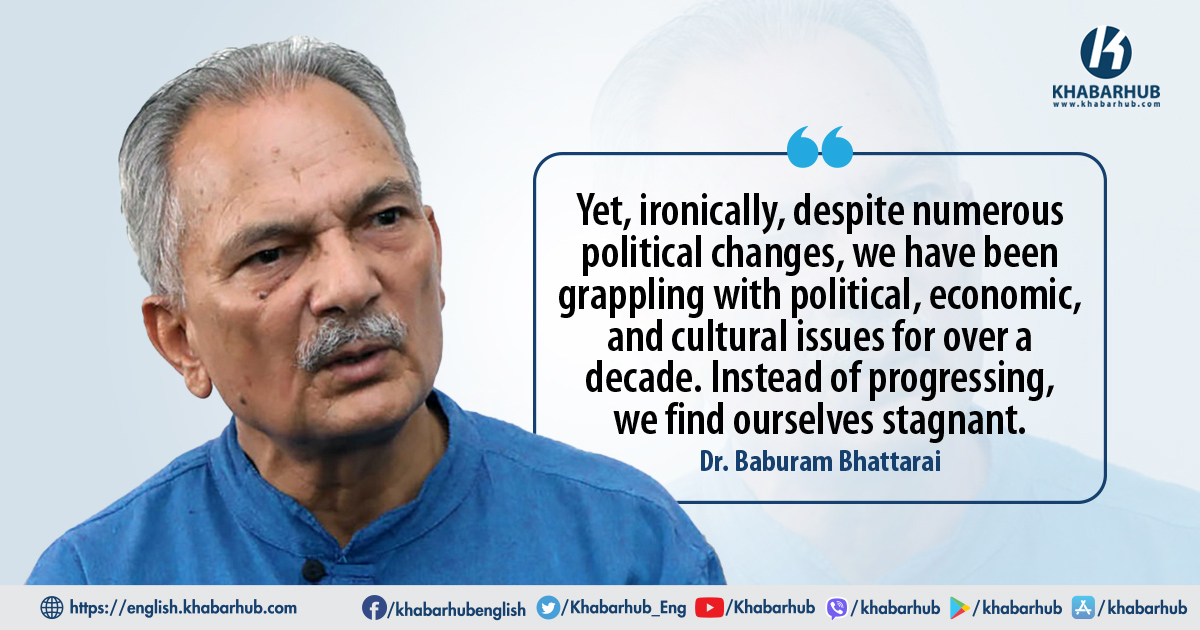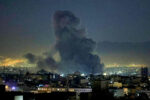Politics embodies both crisis and solution. Our country made a significant political leap by promulgating the Constitution through the Constituent Assembly—a rare political event that unfolds only once in a century.
However, the period that followed has been turbulent, laying the groundwork for transformative changes in political, social, and economic institutions. These shifts should have propelled society forward for generations.
Yet, ironically, despite numerous political changes, we have been grappling with political, economic, and cultural issues for over a decade. Instead of progressing, we find ourselves stagnant.
We are currently facing five major challenges in this decade following the constitution’s adoption:
Political Instability: Our political landscape is marked by instability. To address this, there has been talk of adopting an executive presidential system with provincial governance.
When I served as Prime Minister, we agreed on a mixed government system. However, after the second Constituent Assembly, the situation deteriorated further, and political stability has remained elusive.
The three major leaders currently in power show favoritism toward their allies while feigning opposition to corruption, failing to address the underlying issues.
One of the primary aims of the Maoist “People’s War” was to challenge the old Westminster parliamentary system, which we believed contributed to instability.
We sought a system that could ensure political stability and drive rapid economic prosperity. Sadly, we were mistaken.
The past 8-10 years have mirrored the political turmoil of 2048-2051 BS.
It is particularly ironic that the leader we chose, who served as Prime Minister, oversaw multiple government changes within just a year and a half.
This situation exemplifies our failure to achieve political stability. After so many transitions, we should have established a stable political environment for several decades, which would have paved the way for economic and social transformation.
Economic Stagnation: As someone interested in political economy, I observe that our economy is in dire straits. While some argue we are in recession, we are not even experiencing growth; our economy is stagnant.
Looking at our economic growth over the last 60 years, we have not seen double-digit growth even once.
With a per capita income significantly below the global average, our economy should have ideally grown by at least 20-30%. Instead, it has stagnated.
Internal instability and external dependency contribute to this situation. Our open border with India has fostered an unequal relationship, trapping us in economic stagnation.
The narrative that the Maoist People’s War forced people abroad is misleading; many felt compelled to leave once opportunities opened up, contributing to increased emigration.
It is disappointing that the leaders of Nepali Congress, CPN-UML, and the Maoists have failed to initiate transformative changes, particularly in agriculture, where 60% of the population relies on this sector. They have shown little interest in improving agricultural conditions.
Currently, only 10-12% of our population and GDP are engaged in industry—a figure that has remained unchanged for 60 years.
In contrast, China’s industrial engagement has risen to 35-40%. We have failed to transform our agricultural sector; the economy remains mired in unproductive activities, relying heavily on remittances.
Consequently, our economy has collapsed without any signs of improvement.
Corruption: Corruption often arises from scarcity. When people struggle to meet basic needs, unethical choices become more common.
With inadequate salaries and rising unemployment, many resort to desperate measures.
Although there is widespread discourse on anti-corruption, institutional solutions have not been implemented effectively.
The three major leaders currently in power show favoritism toward their allies while feigning opposition to corruption, failing to address the underlying issues.
Prachanda, for instance, now positions himself as an anti-corruption advocate.
However, the systemic issues remain unresolved, with no substantial progress on good governance.
Management of Diversity: The fourth challenge is our inability to effectively address ethnic and regional diversity.
Few countries exhibit such a rich tapestry of diversity in such a small area.
Managing this diversity is essential, and while we attempted to do so through federalism, it has devolved into a confusing system.
The issues surrounding ethnicity, region, and language remain unresolved.
Geopolitics and relations with India: Our relationship with India continues to pose challenges.
Our dependence on India is growing, and I previously proposed a holistic approach to addressing this through the Eminent Persons Group (EPG).
As controversies arise, the idea of creating a new power seems more elusive than ever. We must take this situation seriously to prevent the country from reaching a critical point.
In our earlier 40-point demands, we pledged to confront these issues head-on. However, after entering the peace process, I sought to address them through the EPG in a more indirect manner.
Yet, I find myself labeled as an Indian broker by some.
Instead of pursuing solutions through the EPG, the Prime Minister visits India and claims that EPG discussions were not on the agenda.
How can we resolve our issues while maintaining the 1950 treaty and open borders?
India is seeking to collaborate with Nepal, but we must actively find solutions rather than leaving problems unresolved.
The current leaders—Sher Bahadur Deuba, KP Oli, and Prachanda—have failed to address these critical issues, leaving the country in crisis.
Alternative power confusion: Today, youth awareness has risen, and a spirit of rebellion is growing. However, without a clear, holistic path forward, we risk driving the country into deeper turmoil.
In the past, we envisioned social, political, and economic transformation through our rebellion, but that vision has faltered.
New alternative forces have emerged, but they often engage in empty rhetoric, fostering anger without offering concrete solutions. This lack of direction is leading the country toward chaos.
The established leaders have failed to deliver, and the new ones are struggling to present a coherent alternative.
As controversies arise, the idea of creating a new power seems more elusive than ever. We must take this situation seriously to prevent the country from reaching a critical point.
(Edited summary of former Prime Minister and Coordinator of the Nepal Samajwadi Party (Naya Shakti), Dr. Baburam Bhattarai’s conversation with journalists on Saturday.)









Comment